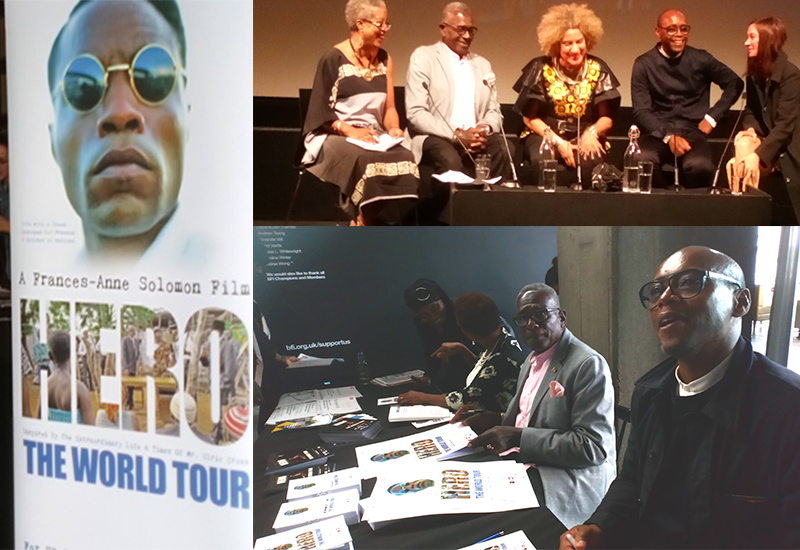Delivering “our own narrative” on history – HERO the film

Review of the film HERO by Debbie Ransome
Director Frances-Anne Solomon described it as “delivering our narrative” on the period which her film covers: World War Two, the post-war years and the emergence of independent nations in Africa. Speaking after the UK premiere of her biopic HERO at the British Film Institute (BFI) on London’s South Bank on 18 May 2019, she told a packed cinema how she had edited together newly dramatised scenes with archive footage from the war and post-war years in England and Africa to follow the life of her subject, Ulric Cross.
If you’re unfamiliar with the hero of the film, Ulric Cross had an amazingly diverse life. Long-time readers of Caribbean intelligence will know of his war service and his motivation to join the RAF after the rise of fascism. Then came years as a lawyer in Africa and his native Trinidad, followed by a distinguished diplomatic career. The film HERO charts his varied life graphically, intercutting wartime footage with scenes of Ulric Cross played by an actor, flying Pathfinder missions with all the bravado of a young wartime serviceman. The new elements bring to life this vivid narrative of mid-20th Century Britain and beyond, taking in the racism which some of our parents or grandparents might have related to us first-hand and the sense of aspiration to be found in Africa’s soon-to-be independent nations. The film also portrays the growing restlessness that Caribbean and African war veterans felt in post-war Britain as doors slammed shut in their faces – and how this helped to fuel the desire for independence back home.
The role of activist George Padmore, portrayed in the film as a determined soul who pulled together the strategy for emerging African leaders, is sympathetic and sometimes troubling. Fraser James, the actor who played Padmore in the film, told the BFI audience that he hadn’t known of the Trinidad-born activist’s role in trying to forge a pan-African vision in 1950s Africa until he’d been recruited. He spoke of how he felt about the “missed opportunity” for a United States of Africa, following Padmore’s mysterious early death.
The film also goes into detail about the role of Caribbean people in the emergence of independent Africa, including Ulric Cross’s role in recruiting Caribbean lawyers for newly independent states. It includes how he immersed himself in his work helping to develop a legal infrastructure for Ghana, Tanzania and Cameroon between 1958 and 1970. The film outlines the ups and downs of Cross’s career in Africa as a Crown Counsel in Ghana, Attorney General in Cameroon and High Court judge and professor of law in Tanzania.
Also powerful is the portrayal of the dark role of MI6 and the CIA in attempting to block moves towards pan-Africanism and plans for the nationalisation of British and American colonial investments across Africa. These parts of the film are not for the squeamish as they show the tough early days and hopes of a continent as independence and pan-Africanism hit the high (and low) notes in 1950s and 60s Africa. This includes the death of the former Belgian Congo’s first Prime Minister, Patrice Lumumba.
There’s a love story too – the tale of Ulric and his wife Ann. This is a tender tale of male and female aspirations which, even though it’s portraying a true story from the 1950s to the 70s, is resonant for our times.
There are also appearances from some loved actors, well-known to Caribbean audiences around the world. Joseph Marcell (of Fresh Prince of Bel Air fame), puts in an excellent performance as Trinidadian historian and journalist CLR James, who was interviewed by Cross during his time at the BBC. The portrayal of James as mentor to post-war Caribbean talent in London is measured and informative, highlighting his role in keeping an eye on the burgeoning Caribbean and African aspirations on the path to independence.
In the Q&A session following the screening, it became clear that veteran Trinidadian-British actor Rudolph Walker’s role in the film’s genesis extended well beyond his cameo as pan-African financier and activist T Ras Makonnen. Frances-Anne Solomon told the BFI audience that getting the EastEnders actor to support the project had given it a “status” and safe patron for other actors who didn’t know about her directorial work. Rudolph Walker himself described how he had worked to get time off from the popular British TV soap in order to be involved in “such a fantastic story”. “We need to leave legacies for our children,” he told the BFI session.
Director Frances-Anne Solomon has strong views on writing black people back into history. “When I was growing up, we learned about the kings and queens of England, not about heroes like Toussaint, Padmore and others like Ulric who gave us the freedoms we now take for granted,” she told Caribbean Intelligence.
“As Caribbean people we grew up surrounded by people who looked like us, but not knowing where we came from. It has always been healing and revelatory to me personally to fill in the gaps, join the dots if you like to tell a complete story. It's like we only had a hazy idea who we are, but through the ritual of storytelling we can fill in the blanks, and bring ourselves to life. I talked about the joy of reclaiming our selves, putting ourselves into history. We are integrally part of the story and, in my films, we are the heroes and heroines of those stories.”
In the round of questions at the BFI, actors, historians and politicians in the audience supported attempts to articulate the role of Caribbean people in history, decried the demise of the pan-African dream and added support to efforts to get the film shown in schools.
In this Windrush, #Metoo era, the film had something for everyone. “We cut black people back into history”, Frances-Ann told her audience.


